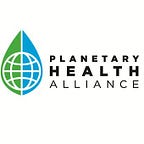Speaker Spotlight: Maria Westerbos
By: Darya Minovi, Speaker Ambassador at the 2018 Planetary Health Annual Meeting
During the 2018 Planetary Health Alliance Annual Meeting, we heard from Maria Westerbos, an expert in using mass communication to create social change. This year, she joined the Blue Planetary Health panel to discuss her successful efforts to combat plastic pollution in our world’s oceans.
A passion for ending the ocean plastic crisis we face today was not always top of mind for Maria Westerbos. A graduate of the University of Amsterdam, Maria started her career as a science journalist, but eventually became involved in the television industry and for almost 25 years worked as a producer for broadcast and production companies. It was in 2008 when everything changed. While working on a project on the major issues of our time, she learned about the by now 8 million (and counting) metric tons of plastic that end up in our oceans each year, creating a “plastic soup” that threatens the health of our environment and the health of people.
Struck by the scale of this problem, Maria left her career in television and traveled around the world to meet people like oceanographer, Charles Moore, who had been working on this issue for over a decade. After returning to The Netherlands she decided to dedicate her life to this work and in 2011, founded the Plastic Soup Foundation.
Today, the Plastic Soup Foundation aims to achieve a simple mission: “No plastic waste in our water!” The organization aims to tackle plastic pollution at the source by using traditional and new media, educational programs, and partnerships with private and public sector to drive behavior change and reduce their plastic footprint. The organization’s first order of business was microbeads — the tiny plastic beads that are often found in cosmetic products like exfoliating scrubs and toothpaste. Due to their incredibly small size, they wash down drains and cannot be filtered out by most wastewater treatment plants, meaning that they easily end up in waterways. These tiny beads are then mistaken for food by fish and can have significant physiological and often fateful consequences for marine life. Even more, toxins such as DDT and BPA can adhere to these plastics and accumulate in the fish tissue, which can have potentially harmful effects on humans who consume marine life.
In August 2012, Maria and her team launched the Beat the Microbead campaign. With her skills in mass communication, Maria was able to create a coalition of 96 NGOs in 40 countries in support of removing microbeads from cosmetic products. They even created an app that allowed consumers to check their products for microbeads. With mounting pressure, cosmetic companies began to pledge to phase microbeads out of their products and more than 50 brands applied for the “Zero Plastic Inside” certification for their products. To date, 448 brands from 119 different manufacturers have removed plastic microbeads from their products.
After the widespread (and continuing) success of her first campaign, Maria has now shifted her efforts to a lesser known but even more alarming problem: microfibers. Her second campaign, Ocean Clean Wash aims to address the 9 million tons of microfiber released from washing our clothes each year when we wash them. Like microbeads, these tiny fibers can be consumed by marine life and potentially cause harm to both animals and humans. The problem is so pervasive that a 2016 study found that three to ten tons of microfibers rain out of the air in Paris each year. Once again, Maria is using creative communications and an alliance of NGOs, scientists, and clothing brands to advocate for solutions like a washing machine filter, filtering washing bags, and even a microfiber-catching laundry ball that any of us can easily implement in our own lives.
To date, the Plastic Soup Foundation’s incredible work has been recognized in publications around the world. In 2014, the organization won the Dutch PR Award for their Beat the Microbead campaign. In 2017, Maria was also named one of the 100 most influential people in Dutch philanthropy. Maria is now in the process of launching a third campaign, with the working title, “Plastic is a human health issue.” Click here to learn more.
Disclaimer: The views and opinions expressed in this article are those of the author and do not necessarily reflect the position of the Planetary Health Alliance or its members.
